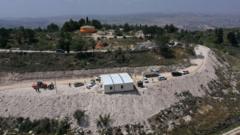Prime Minister Benjamin Netanyahu of Israel continues to advocate for military action against Iran's nuclear facilities, conflicting with President Trump's pursuit of diplomatic negotiations, leading to heightened tensions between the two leaders.
**Diplomatic Tensions Rise as Trump and Netanyahu Clash Over Iran's Nuclear Deal**

**Diplomatic Tensions Rise as Trump and Netanyahu Clash Over Iran's Nuclear Deal**
As Trump aims for a negotiated solution with Iran, Israel's Netanyahu pushes for military strikes, creating friction.
As the Trump administration maneuvers to secure a nuclear deal with Iran, Israeli Prime Minister Benjamin Netanyahu stands firm in threatening military action against Iran's key nuclear enrichment sites. This ongoing conflict complicates President Trump's diplomatic efforts, according to sources familiar with the negotiations.
Recent developments have escalated tensions, resulting in a heated phone conversation between Trump and Netanyahu, alongside several strategic meetings involving high-ranking officials from both nations. Trump announced optimism on Sunday, signaling that positive outcomes from the negotiations to limit Iran's nuclear capabilities could be imminent.
However, insiders caution that despite Trump's hopeful outlook, the negotiations could result in merely a framework of common principles, rather than a concrete agreement. Key issues, including whether Iran will maintain uranium enrichment and the fate of its stockpile of near-weapons-grade fuel, remain unresolved.
Reports earlier this year indicated that Israel had been preparing to attack Iranian nuclear installations but was persuaded to delay such actions by Trump, who preferred ongoing negotiations with Tehran. Nevertheless, Netanyahu's insistence on preemptive military measures, even without U.S. backing, amplifies the discord between the two leaders.
At the heart of the tension lies their divergent strategies to address the perceived vulnerability of Iran amid ongoing diplomatic discussions. This clash not only highlights the complexity of U.S.-Israel relations but also introduces potential ramifications for international efforts to monitor and limit Iran's nuclear ambitions.
Recent developments have escalated tensions, resulting in a heated phone conversation between Trump and Netanyahu, alongside several strategic meetings involving high-ranking officials from both nations. Trump announced optimism on Sunday, signaling that positive outcomes from the negotiations to limit Iran's nuclear capabilities could be imminent.
However, insiders caution that despite Trump's hopeful outlook, the negotiations could result in merely a framework of common principles, rather than a concrete agreement. Key issues, including whether Iran will maintain uranium enrichment and the fate of its stockpile of near-weapons-grade fuel, remain unresolved.
Reports earlier this year indicated that Israel had been preparing to attack Iranian nuclear installations but was persuaded to delay such actions by Trump, who preferred ongoing negotiations with Tehran. Nevertheless, Netanyahu's insistence on preemptive military measures, even without U.S. backing, amplifies the discord between the two leaders.
At the heart of the tension lies their divergent strategies to address the perceived vulnerability of Iran amid ongoing diplomatic discussions. This clash not only highlights the complexity of U.S.-Israel relations but also introduces potential ramifications for international efforts to monitor and limit Iran's nuclear ambitions.




















